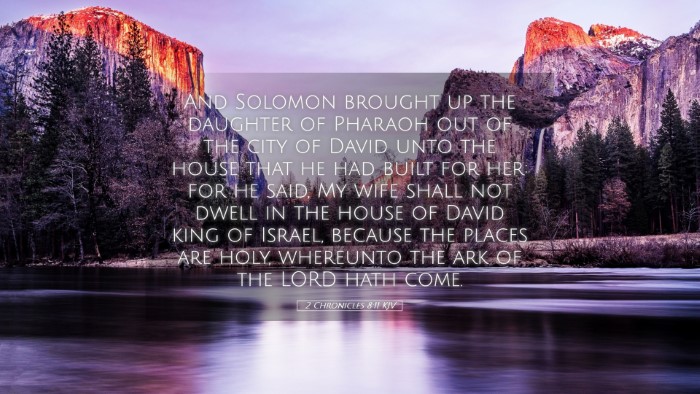Commentary on 2 Chronicles 8:11
Bible Verse: "And Solomon brought up the daughter of Pharaoh out of the city of David unto the house that he had built for her: for he said, My wife shall not dwell in the house of David, because the places are holy, whereunto the ark of the LORD hath come."
Introduction
This verse occurs in a pivotal section of the Chronicler's narrative, highlighting Solomon’s commitments to both diplomacy and the sanctity of God's worship. It opens up insights into the socio-political landscape of Israel during Solomon's reign, which was marked by significant construction and consolidation of power.
Historical Context
The marriage of Solomon to the daughter of Pharaoh is critical for understanding the alliances formed through marriage in the ancient world. Such unions often served political purposes, providing peace and security between nations.
Commentary Insights
-
Matthew Henry's Commentary
Henry notes that Solomon's choice to bring Pharaoh's daughter into Jerusalem showcases both his wisdom in statecraft and his dedication to maintaining the sanctity of worship. He emphasizes that even in diplomacy, Solomon was careful to respect the holy places of Israel, leading to the construction of a separate dwelling for his foreign wife.
-
Albert Barnes' Notes
Barnes elaborates on the significance of Solomon's actions as reflective of his understanding of God’s covenant with Israel. He posits that the separation of the Pharaoh’s house from the "house of David" was essential, ensuring that the worship of God remained untainted by foreign influences. Barnes further discusses the implications of Solomon's decisions on the future of Israel’s faithfulness to God.
-
Adam Clarke's Commentary
Clarke provides a rich cultural context, explaining that the wife of Pharaoh, being a foreigner, would bring with her different customs and beliefs. He warns that while alliances are important, they must not compromise the integrity of faith and practice within God’s chosen people. Clarke reflects on how Solomon’s actions here foreshadow the eventual blending of worship practices that would lead to Israel's downfall.
Theological Implications
This verse invites reflection on the nature of alliances in the Christian life. Solomon’s marriage highlights how often our spiritual fervor can be tested by cultural and worldly influences. The care with which Solomon built a dwelling for his wife signifies the need for boundaries and careful discernment in relationships that might lead believers away from God’s commandments.
Practical Applications
For modern readers, especially those in pastoral roles, this passage serves as a reminder of the importance of maintaining the holiness of God’s dwelling places—our hearts and communities. The construction of separate spaces can be both literal and metaphorical, suggesting the importance of establishing environments conducive to faith and divine worship.
Conclusion
2 Chronicles 8:11 calls believers to examine the interplay between their relationships and their faith. By reflecting on historical precedents established by Solomon, pastors, students, and scholars can gain insight into the necessity of safeguarding spiritual integrity even amidst the pursuit of peace and prosperity. The lessons from Solomon’s reign encourage vigilance in upholding God's holiness in every aspect of life.


